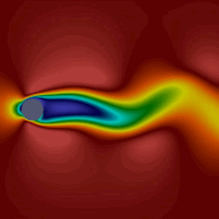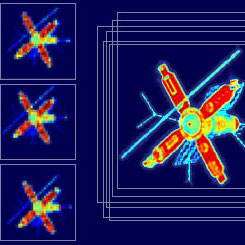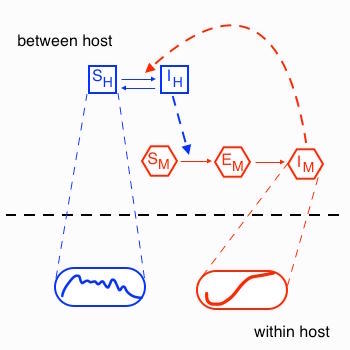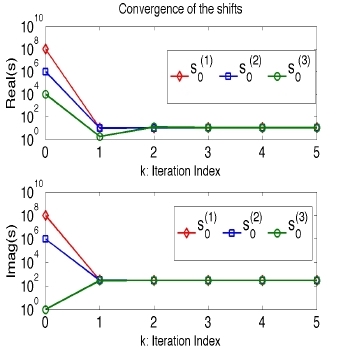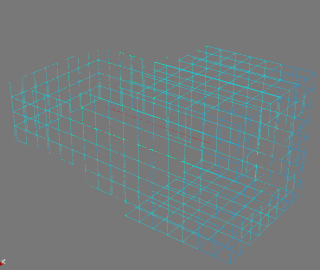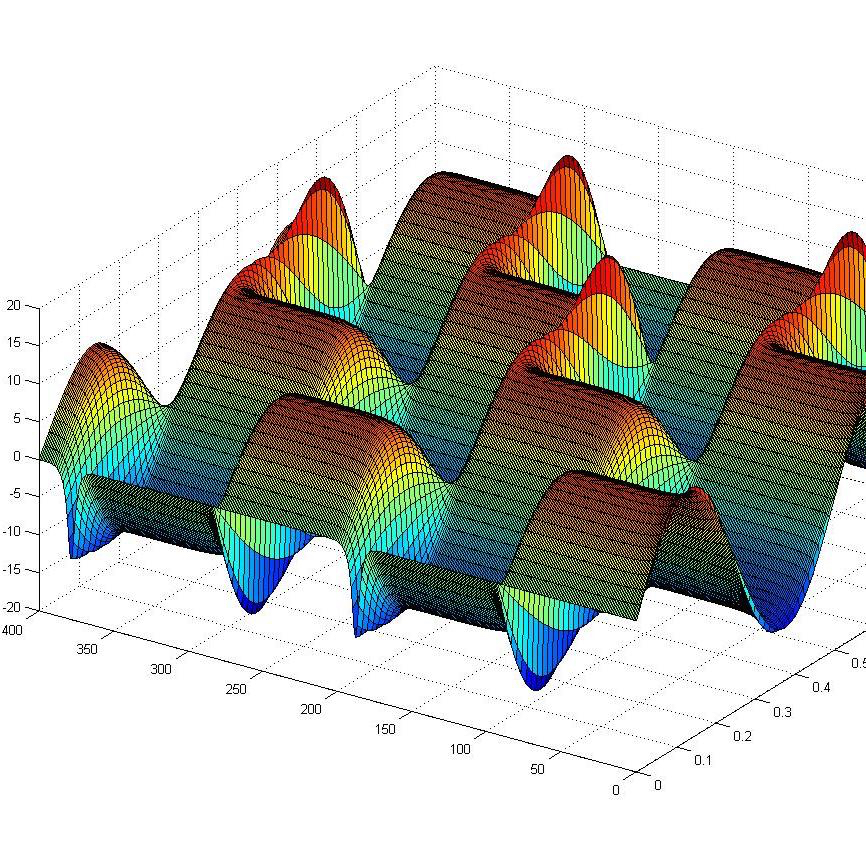Applied & Computational Mathematics
Applied and computational mathematics includes mathematics with a wide range of applications across the sciences. Specific research areas can be found in faculty descriptions below.

Researcher Advisors for Applied & Computational Mathematics
-
Bio Item
 Nicole Abaid , bio
Nicole Abaid , bioDr. Abaid's research focuses on networked dynamical systems. She studies diverse biological systems, ranging from animal groups to brain networks, to inspire novel results in mathematical modeling and control.
-
Bio Item
 Slimane Adjerid , bio
Slimane Adjerid , bioProfessor Adjerid conducts research on developing new discontinuous finite element methods for solving partial differential equations.
-
Bio Item
 Daniel Appelö , bio
Daniel Appelö , bioProfessor Daniel Appelö is a numerical analyst with an interest in computational techniques for solving differential equations fast and accurately. He is excited about applications in acoustics, electromagnetics, fluids, and more recently in quantum computing.
-
Bio Item
 Christopher Beattie , bio
Christopher Beattie , bioThe principal research interests of Professor Beattie are in the areas of scientific computing and large scale computational linear algebra, with an emphasis on iterative Krylov methods.
-
Bio Item
 Jeff Borggaard , bio
Jeff Borggaard , bioProfessor Borggaard studies the design and control of fluids. This includes computational fluid dynamics, control theory, optimization, sensitivity analysis, uncertainty quantification, and reduced-order models. In each case, the application of these research areas to partial differential equations that describe fluids are of interest.
-
Bio Item
 Paul Cazeaux , bio
Paul Cazeaux , bioProfessor Cazeaux's research deals with multiscale phenomena in mathematical physics and biology, with recent applications in quantum chemistry and condensed matter physics (2D materials).
-
Bio Item
 Yingda Cheng , bio
Yingda Cheng , bioProfessor Cheng's research areas are in scientific computing, applied mathematics and data-driven modeling and computation. She develops numerical methods for partial differential equations, particularly those in higher dimensional space. The application area of Professor Cheng's research includes fusion energy and semiconductor device modeling, to name a few.
-
Bio Item
 Lauren M. Childs , bio
Lauren M. Childs , bioProfessor Childs develops and analyzes mathematical and computational models to examine biologically-motivated questions.
-
Bio Item
 Giuseppe Cotardo , bio
Giuseppe Cotardo , bioDr. Cotardo’s research interest is in algebraic coding theory, with a particular focus on algebra, geometry, combinatorics, and their applications to the invariant theory of rank-metric codes. He is also actively working on network communication and quantum error correction.
-
Bio Item
 Eric de Sturler , bio
Eric de Sturler , bioProfessor de Sturler's research focuses on numerical analysis for large-scale computational problems with an emphasis on fast solvers for linear and nonlinear systems, inverse problems and parameter estimation, optimization, and design, including iterative solvers and numerical linear algebra, randomization, stochastic methods, model reduction, and high performance computing with applications in computational mechanics, such structural optimization and computational fluid dynamics, tomography and image reconstruction, big data, computational physics, biology, and computer graphics.
-
Bio Item
 Mark Embree , bio
Mark Embree , bioCMDA Program Director Professor Embree studies numerical linear algebra and spectral theory, with particular interest in eigenvalue computations for nonsymmetric matrices and transient behavior of dynamical systems.
-
Bio Item
 Ionut-Gabriel Farcas , bio
Ionut-Gabriel Farcas , bioProfessor Farcaș's research bridges scientific computing, high-performance computing, and computational physics. His work focuses on scientific machine learning, reduced and surrogate modeling, uncertainty quantification, and sparse grid and multi-fidelity methods. These computational techniques are designed to tackle complex, large-scale numerical simulations, such as those arising in turbulent transport in fusion devices or combustion processes in rocket engines.
-
Bio Item
 Serkan Gugercin , bio
Serkan Gugercin , bioProfessor Gugercin studies computational mathematics, numerical analysis, and systems and control theory with a focus on data-driven modeling and model reduction of large-scale dynamical systems with applications to inverse problems, structural dynamics, material design, and flow control.
-
Bio Item
 Traian Iliescu , bio
Traian Iliescu , bioAt the core of Professor Iliescu's research program is his vision of using both mathematics and computations to provide new knowledge on turbulent fluid flows dominated by coherent structures and create models with practical impact in engineering, climate modeling, and medicine. The ultimate goal of his research program is to transform turbulence modeling as we know it today and use mathematics, computations, physics, and data to discover general laws of turbulent fluid flows.
-
Bio ItemTao Lin , bio
Professor Tao Lin's main research interest is the numerical analysis on computational methods related with differential equations. He designs new numerical methods and carry out their convergence analysis. His recent research focuses on immersed finite element (IFE) methods that can solve interface problems of partial differential equation with interface independent meshes. He is also working on applying IFE methods to interface inverse problems via the shape optimization methodology.
-
Bio Item
 Honghu Liu , bio
Honghu Liu , bioProfessor Liu's research focuses on the design of effective low-dimensional reduced models for nonlinear deterministic and stochastic PDEs as well as DDEs. Applications to classical and geophysical fluid dynamics are actively pursued. Particular problems that are addressed include bifurcation analysis, phase transition, surrogate systems for optimal control, and stochastic closures for turbulence.
-
Bio Item
 Agnieszka Miedlar , bio
Agnieszka Miedlar , bioProfessor Miedlar conducts research in numerical analysis and scientific computing, with a focus on iterative solvers for large-scale linear systems and eigenvalue problems, and adaptive finite element methods (AFEMs).
-
Bio Item
 Mirjeta Pasha , bio
Mirjeta Pasha , bioDr. Pasha is an Assistant Professor with research interests on high dimensional (tensor) data analysis, regularization for inverse problems, uncertainty quantification, and high-performance computing. She develops computationally efficient methods and algorithms to solve large-scale problems that arise from an extensive list of applications in data science, medicine, and engineering.
-
Bio Item
 Michael A. Robert , bio
Michael A. Robert , bioProfessor Robert builds and analyzes mathematical models to study biological phenomena. He is particularly interested in developing and exploring models to better understand how ecological, meteorological, anthropogenic, and evolutionary processes impact the emergence, spread, and control of infectious diseases.
-
Bio Item
 Johann Rudi , bio
Johann Rudi , bioProfessor Johann Rudi's research is interdisciplinary and spans large-scale parallel iterative methods for nonlinear and linear systems, development and implementation of algorithms for high-performance computing (HPC) platforms, computational aspects of inverse problems, and quantification of uncertainties in the inferred parameters.
-
Bio Item
 Shu-Ming Sun , bio
Shu-Ming Sun , bioProfessor Sun's research interests include the mathematical theory of fluid mechanics, the theory of partial differential equations, and applied nonlinear analysis.
-
Bio Item
 Peter Wapperom , bio
Peter Wapperom , bioProfessor Wapperom conducts research in computational fluid dynamics of complex fluids. This involves the mathematical modeling and numerical simulation of the flow of polymeric liquids and fluids reinforced with rigid particles.
-
Bio Item
 Tim Warburton , bio
Tim Warburton , bioProfessor Warburton holds the John K. Costain Chair in the College of Science at Virginia Tech and is a faculty member of both the Department of Mathematics and the Computational Modeling and Data Analytics program. His research interests include developing new parallel algorithms and methods that are used to solve PDE based physical modes on the largest supercomputers.
-
Bio Item
 Steffen Werner , bio
Steffen Werner , bioProfessor Werner conducts research at the intersection of scientific computing and numerical linear algebra with particular focus on scientific machine learning, model order reduction, data-driven modeling, optimization and control of partial differential equations, matrix equations and mathematical software development.
-
Bio Item
 Pengtao Yue , bio
Pengtao Yue , bioProfessor Yue works on the numerical simulation of flow problems with moving boundaries and complex rheology, including multiphase flow, viscoelastic fluids, dynamic wetting, and phase change phenomena.
-
Bio Item
 Lizette Zietsman , bio
Lizette Zietsman , bioProfessor Zietsman's research area covers the development and analysis of fundamental numerical algorithms arising in the study of stability, control and estimation of distributed parameter systems typical in structural control, fluid flow control, and thermal systems.
Researchers of Applied & Computational Mathematics
-
Bio Item
 Gazi Mahmud Alam , bio
Gazi Mahmud Alam , bioDr. Alam's research interests are focused on the development of methods and algorithms for solving control and inverse problems on quantum graphs.
-
Bio Item
 Måns Andersson , bio
Måns Andersson , bioDr. Andersson is a Postdoctoral Associate whose research focuses on large-scale simulations, numerical algorithms, and high-performance computing. He is mentored by Daniel Appelo and Yingda Cheng.
-
Bio Item
 John Taylor Burleson , bio
John Taylor Burleson , bioInstructor Burleson is currently engaged with teaching with an interest in computational fluid dynamics.
-
Bio Item
 Nilton Garcia Hilares , bio
Nilton Garcia Hilares , bioDr. Hilares' research interests lie in computational and applied linear algebra.
-
Bio ItemMax Heldman , bio
Dr. Heldman is a Postdoctoral Associate. His research focuses on numerical analysis and scientific computing, particularly in the area of reaction-drift-diffusion and mean-field limits of particle-based stochastic models. He is mentored by Johann Rudi.
-
Bio Item
 Kun Huang , bio
Kun Huang , bioDr. Huang is a Postdoctoral Associate specializing in numerical methods for kinetic equations, with a particular emphasis on applications in plasma physics.. He is currently interested in low-rank tensor methods for high-dimensional problems. He is mentored by Daniel Appelo and Yingda Cheng.
-
Bio Item
 Delio Jaramillo Velez , bio
Delio Jaramillo Velez , bioDr. Jaramillo Velez is a postdoctoral associate interested on algebraic coding theory, combinatorial commutative algebra and machine learning. He is mentored by Hiram Lopez.
-
Bio ItemJiuhua Hu , bio
Dr. Hu is a Postdoctoral Associate whose research focuses on numerical analysis and scientific computing, particularly the development of fast and efficient numerical methods for differential equations. She is mentored by Daniel Appelo and Yingda Cheng.
-
Bio Item
 Jorge Reyes , bio
Jorge Reyes , bioDr. Reyes is a Postdoctoral Associate whose research focuses on the theoretical and computational study of fluid dynamics based on the Navier–Stokes equations. His work includes finite element analysis of numerical solutions for full-order models and the development of corresponding reduced-order models. He is mentored by Traian Iliescu.
-
Bio ItemAndrea Carracedo Rodriguez , bio
Dr. Carracedo Rodriguez conducts research in numerical analysis, with a focus on efficiently building approximations to dynamical systems from data or via model reduction.
-
Bio ItemRodrigo San José Rubio , bio
Dr. San José is a Presidential Postdoctoral Associate with research focusing on algebraic coding theory. In particular, he is interested in the applications of commutative algebra and algebraic geometry to classical and quantum codes, as well as cryptography. He is mentored by Hiram Lopez.
-
Bio Item
 Priyanka Sinha , bio
Priyanka Sinha , bioDr. Sinha is a Postdoctoral Associate, working on large-scale inverse problems, multi-distribution learning, and adversarial methods, with recent projects on distributed tomographic reconstruction and fairness-driven federated learning. She is mentored by Eric de Sturler.
-
Bio Item
 Feroz Soomro , bio
Feroz Soomro , bioI focus on Scientific Machine Learning, using advanced computational methods to solve complex problems in data-driven modeling. My research involves developing innovative algorithms and tools to analyze large-scale datasets, with a special emphasis on healthcare applications.
-
Bio Item
 Turker Topcu , bio
Turker Topcu , bioDr. Topcu works in the field of computational science. His research involves developing algorithms and codes to solve partial and ordinary differential equations to simulate quantum dynamical systems.
-
Bio Item
 Ping-Hsuan Tsai , bio
Ping-Hsuan Tsai , bioDr. Tsai is a Postdoctoral Associate focusing on the development of data-driven reduced-order models for turbulent heat transfer applications. His research emphasizes stabilization strategies and error indicators for turbulent flows, with the goal of supporting engineering design and analysis. He is mentored by Traian Iliescu.
-
Bio Item
 Eric Ufferman , bio
Eric Ufferman , bioCollegiate Assistant Professor Ufferman teaches classes in both Computational Modeling and Data Analytics and Discrete Mathematics.
-
Bio Item
 Jason Wilson , bio
Jason Wilson , bioCollegiate Assistant Professor Wilson teaches Math and CMDA classes. His research interests include large scale linear algebra, high performance computing, and the mathematical foundations of data science.
Recently Retired Faculty
-
Bio Item
-
Bio Item
-
Bio Item
-
Bio Item
-
Bio Item



